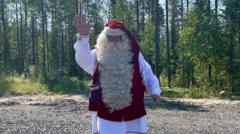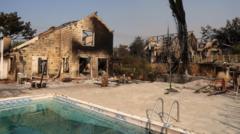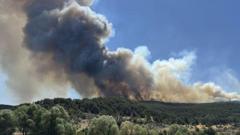Rovaniemi, Finland, is currently in the midst of an extraordinary heatwave, with temperatures reaching unprecedented highs, prompting concern over climate change impacts in the Arctic.
Heatwave Hits Lapland: Santa Faces Unprecedented High Temperatures

Heatwave Hits Lapland: Santa Faces Unprecedented High Temperatures
Lapland, where winter magic thrives, is experiencing record-breaking heat, forcing Santa and his elves to adapt to unusual conditions.
As the summer heat lingers over Lapland, Santa Claus finds himself giving hydration reminders to his team of elves. The region, renowned for its wintery charm, has been enduring days of soaring temperatures around 30°C, leaving Santa to stay indoors during the hottest hours of the day. "I'm only going out for a swim in the lake in the forest after 18:00, when the weather has started to cool off," he remarked.
The joy of preparing for the next Christmas season is tempered by the severity of the situation. According to meteorologist Jaakko Savela from the Finnish Meteorological Institute, this episode marks the longest heatwave in Finnish Lapland since 1972, spanning 15 days. He explained that unusual hot spells are now a glaring indicator of climate change, with Lapland seeing temperatures 10°C above the seasonal norm.
The alarming heat has not just affected the iconic Santa Claus village in Rovaniemi, where temperatures soared to 33°C this week, but also impacted the local wildlife. The heralded reindeer, synonymous with Christmas, are struggling as they seek respite from swarming mosquitoes that thrive in these warmer conditions. Experts warn that the future may require reindeer herders to provide shaded areas to protect their animals from the intensified heat.
Tourists drawn to Lapland's cool climate are left bewildered by the warmth. Visitors like Silvia from Prague expressed disbelief at the soaring temperatures: "I came to escape the heat... I expected much colder weather!"
Local employee Elina, an elf at Santa's post office, shared her concerns, fearing that heatwaves may become a new norm for Lapland's environment. For Santa, accustomed to his heavy winter attire, the heat poses an added challenge as he ventures out only during cooler evenings. Expressing his preference for colder conditions, he added, "Of course a hot summer can be very nice for some but I prefer cold and snow."
As the effects of climate change grow more pronounced, those in Lapland are left pondering how this extreme weather might redefine their celebrated winter haven.
The joy of preparing for the next Christmas season is tempered by the severity of the situation. According to meteorologist Jaakko Savela from the Finnish Meteorological Institute, this episode marks the longest heatwave in Finnish Lapland since 1972, spanning 15 days. He explained that unusual hot spells are now a glaring indicator of climate change, with Lapland seeing temperatures 10°C above the seasonal norm.
The alarming heat has not just affected the iconic Santa Claus village in Rovaniemi, where temperatures soared to 33°C this week, but also impacted the local wildlife. The heralded reindeer, synonymous with Christmas, are struggling as they seek respite from swarming mosquitoes that thrive in these warmer conditions. Experts warn that the future may require reindeer herders to provide shaded areas to protect their animals from the intensified heat.
Tourists drawn to Lapland's cool climate are left bewildered by the warmth. Visitors like Silvia from Prague expressed disbelief at the soaring temperatures: "I came to escape the heat... I expected much colder weather!"
Local employee Elina, an elf at Santa's post office, shared her concerns, fearing that heatwaves may become a new norm for Lapland's environment. For Santa, accustomed to his heavy winter attire, the heat poses an added challenge as he ventures out only during cooler evenings. Expressing his preference for colder conditions, he added, "Of course a hot summer can be very nice for some but I prefer cold and snow."
As the effects of climate change grow more pronounced, those in Lapland are left pondering how this extreme weather might redefine their celebrated winter haven.





















